Thomas Wright, Director of the Center on the United States and Europe; Senior Fellow in the Project on International Order and Strategy: The summit today, and the visit to Brussels and the U.K. that preceded it, revealed that the president is now unbound, acting in accordance with his visceral beliefs about America’s role in the world. These date back over 30 years and include opposition to alliances and free trade, and his support for authoritarian strong men and Russia. In the first year of his administration, there was some hope that he would be contained by the so called “axis of adults.” Now, it is clear that that containment effort has failed and Trump is unbound. He has fired or ignored those who tried to manage him. The hawks that remain are cowed and compliant with his wishes—the sight of John Bolton supervising a policy of accommodation toward Kim Jong-un and Vladimir Putin is nothing short of extraordinary. The reckoning will come in the next international crisis when the United States may be called upon to act to uphold the international order only for the president to refuse or to take the wrong side. Each member of the administration must ask themselves how they can best serve the national interest—by working to limit the damage imposed by the president from the inside or by resigning and speaking out. Those who recently left, like H. R. McMaster and Rex Tillerson, are free from such conflicts and have a national duty to tell the American people what they know about the president’s real foreign policy agenda. Sunlight is a disinfectant that needs to be used with some haste.
Alina Polyakova, David M. Rubenstein Fellow in the Center on the United States and Europe: The worst scenario was avoided in Helsinki: There was no grand bargain on Ukraine, no Russian deal on Syria, and no reneging of U.S. security commitments to Europe. But it was still the Russian president who won at the summit. Without a clear agenda from the U.S. side, it was up to Russia to lead the way, and Putin certainly did that: On Ukraine, Putin repeated the (false) Kremlin line that Kyiv was to blame for no progress being made on the Minsk agreements. He also had to explain the U.S. policy on Crimea, with Trump apparently being unwilling to do so. On Syria, Putin suggested that Russia mediate a global coalition to help Syrian refugees and secure the Israeli border, which would help solidify Russia’s role as the great power in the Middle East. It’s possible that President Trump was assured of various Russian concessions in the one-on-one meeting with Putin before the public briefing, but watching from the outside, it certainly looked like Putin was holding the winning hand.
Constanze Stelzenmüller, Robert Bosch Senior Fellow in the Center on the United States and Europe: After one of the most cringe-worthy press conferences ever held by an American president (preceded by a shock-and-awe tour of Europe), it’s worth focusing on some essentials.
In terms of formal policy outcomes, the worst has not happened, because the administration has managed to wrestle down the president: The United States is staying the course on the illegality of the Russian annexation of Crimea, on the war in Ukraine, on deterrence and defense of NATO’s eastern periphery. For this, we Europeans should be grateful. I know I am.
In terms of the intangibles that hold this alliance together—shared values, mutual commitment, and trust—the damage done by the president is incalculable. One look at the delighted faces of our adversaries confirms it.
We need to decide what the president’s game is—is he playing reality TV, or destroying the rules-based international order? It matters. In the one, we Europeans are just viewers, and can simply turn off the TV. In the other, we’re vassals. Demands that are impossible to meet (such as raising European defense spending to 4 percent of GDP) suggest the latter.
So far, European leaders and policymakers have been reacting with remarkable restraint. But above all, they must act. They should close vulnerabilities (defense spending, the Nord Stream 2 gas pipeline), and invest in cohesion and trust—with each other, but also with those elements of the U.S. administration that want to maintain the Western alliance. In this, Germany will be key.
Above all, it needs to be understood that the rift between those who seek to maintain republican constitutional orders, representative democracy, political pluralism, open and decent societies, and a rules-based international order and its adversaries is the single greatest challenge of our time—and it runs through all our countries. Schadenfreude is not in order.
Steven Pifer, Nonresident Senior Fellow in the Center on the United States and Europe and the Arms Control and Non-Proliferation Initiative: The history of American presidential travel has seen nothing like Donald Trump’s July 11-16 sojourn. He began in Brussels with continuing public blasts at allies for not spending enough on defense that totally overshadowed a useful set of NATO summit agreements. In Britain, America’s closest ally, Trump used interviews to criticize beleaguered Prime Minister May’s handling of Brexit and put the European Union first on his list of foes of the United States.
In Helsinki, Trump delivered perhaps the most embarrassing press conference performance ever by an American president. With Vladimir Putin standing at his side, Trump did not mention Russian aggression against Ukraine; when asked, could not name a single issue on which Kremlin action had contributed to the downturn in U.S.-Russia relations; took Putin’s denial of interference in the 2016 election over the conclusion of the U.S. intelligence community and did not say that Russia should cease such meddling or face consequences. Putin must have been thrilled. One can hope that Trump did better in the actual meeting, but is there any reason to think so?
U.S. national interests would have been better served had Trump stayed home this past week.
Pavel Baev, Nonresident Senior Fellow in the Center on the United States and Europe; Research Professor, Peace Research Institute Oslo (PRIO): In all the fuss and fanfare around the Helsinki summit, few pundits entertained the possibility of failure. The working assumption was that both Trump and Putin need to make the long-anticipated and poorly prepared rendezvous a success. Their definitions of success were close enough to eliminate the “Who won?” question, since both were ready to push away all difficult issues and concentrate on personal relationship. For those concerned with the risks and drivers of the crisis in U.S.-Russian relations, such definition makes success indistinguishable from failure, as the substance of arms control and management of many crises remains unaddressed.
For the two leaders, however, feelings matter above everything else, quite possibly because the main feeling is fear. Each is afraid that the other could hit and damage sensitive interests pertaining to Trump’s legitimacy and Putin’s money. Managing this fear factor cannot be entrusted to aids because no one is privy to the full extent of these interests. The face-to-face meeting lasting 130 minutes was apparently a success in calming these fears, but the working lunch of the two delegations was a clearly failure in achieving a modicum of progress on any of the conflicts that shape the evolving confrontation.
Amanda Sloat, Robert Bosch Senior Fellow in the Center on the United States and Europe: The NATO summit was very successful in terms of substance, and it could have easily generated positive headlines. The Alliance produced a communiqué that highlighted its significant progress in recent years, including steps to enhance defense spending, increase resilience on its eastern border against Russian aggression, and address threats from its southern periphery.
Yet these noteworthy developments were overshadowed by President Trump’s theatrics and single-minded focus on keeping score. It is certainly important for allies to have sufficient capabilities to defend themselves and each other, a goal shared by previous American presidents. Yet Trump’s bullying tactics undermine NATO unity. They aren’t even effective, making it more difficult for some allies to sell enhanced measures to skeptical publics.
Some continue to argue that we should focus on the substance rather than the rhetoric. This would be a mistake. The reality is the president’s continued outbursts are deeply corrosive to the trust upon which NATO rests. Trump approaches allies like business adversaries, whom he seeks to best in negotiations. Unfortunately, foreign policy doesn’t allow leaders the luxury of attacking allies one day while expecting their assistance the next day. The trans-Atlantic alliance is facing too many challenges to waste time fighting internally rather than developing strategies to project strength externally.
Célia Belin, Visiting Fellow in the Center on the United States and Europe: The Helsinki summit concludes an extraordinary sequence of trans-Atlantic turmoil, first during the NATO summit and second in an excruciatingly clumsy visit to the U.K., when Trump has pounded allies with criticism. When contrasted with a much warmer summit and press conference with president Putin, the triple-event has blurred the line between friends and foes.
Undoubtedly, Russia and the United States are structural rivals, which have been on a path of increasing confrontation for the past 10 years. The illegal annexation of Crimea, Russia’s intervention in Syria, and Russian meddling in U.S. elections have created a large bipartisan consensus in Washington on the need to push back on Russia.
And yet, President Trump—along with supporters and enablers within his administration and outside—have become objective allies to Putin’s Russia in weakening the trans-Atlantic community, and more precisely in attacking the European Union.
More than NATO in some ways, President Putin views the EU as a rival for influence in Eastern Europe and within former communist states—it is the prospect of Ukraine’s association agreement with the EU that compelled him to restate Russia’s influence over the country.
As for President Trump, he has repeatedly portrayed the EU as a threat, and recently as a “foe” for the United States over trade competition, going as far as encouraging France to leave the Union or threatening the U.K. for looking for a “soft Brexit.”
This situation will only reinforce Europeans’ awareness of the absolute necessity of regaining independence from the United States, which has been increasingly using its economic and military proximity with Europe as a weapon for domination.
Kemal Kirişci, TÜSİAD Senior Fellow in the Center on the United States and Europe; Director of The Turkey Project: In spite of all the concerns and fears about President Trump wrecking the NATO summit and deepening the trans-Atlantic rift, NATO members were able to adopt a communiqué that reaffirmed the values and objectives of the alliance. It especially reinforced the commitment to “our common values, including individual liberty, human rights, democracy, and the rule of law.” This is undoubtedly welcome, but it comes at a time when there is increasing talk about democratic regression in the West. It will be interesting to see whether NATO as an institution will be able to find the means to achieve these goals.
Producing a troubling image, President Trump and Recep Tayyip Erdoğan of Turkey—on his first trip abroad after his decisive electoral victory—walked almost hand-in-hand behind the group of NATO leaders on their way to the family picture. Both leaders command the two largest armies of NATO and both have shown scant regard for the lofty democratic goals. Realism and sheer geopolitics uncomfortably suggests that commitment to “common defense” and Article V, also emphasized in the communiqué, may well take precedence; revamping liberal democracy is likely to wait another day.
Tarun Chhabra, Fellow in the Project on International Order and Strategy: “He goes for destruction, universal destruction; and it seems to be his greatest ambition to efface and obliterate every trace of the wisdom of his predecessors…He lives by excitement, perpetual, agitating excitement, and…has never been without some subject of attack, either in individuals, or in masses, or in institutions.”
This was how Kentucky Senator Henry Clay described President Andrew Jackson in 1834, in the midst of Senate debate over a formal censure of Jackson. It is also a fitting description of Trump’s seven-day foreign policy tornado through Brussels, London, and Helsinki.
The destruction in this case may be delayed, because most of America’s European allies remain committed to open societies, and the role of trans-Atlantic security and commerce in sustaining them. They lack, for the moment, good alternatives to U.S. leadership. But Trump’s routine of abuse and abandonment, combined with his lead role in the transnational, “populist-nationalist internationale,” will eventually become weaponized within the domestic politics of allied countries. As Putin hopes, European party platforms and political brands will congeal around strategic futures that presume the United States is unreliable, or even a threat.
In the meantime, having learned they cannot appease Trump, our friends and allies will try to survive him. They will look intently toward the U.S. presidential primaries beginning in 2019. Will Trump’s worldview be isolated and disavowed, or will we find Trump has kicked open a new door through which leading U.S. politicians–of either party–are willing to follow?
The Brookings Institution is committed to quality, independence, and impact.
We are supported by a diverse array of funders. In line with our values and policies, each Brookings publication represents the sole views of its author(s).


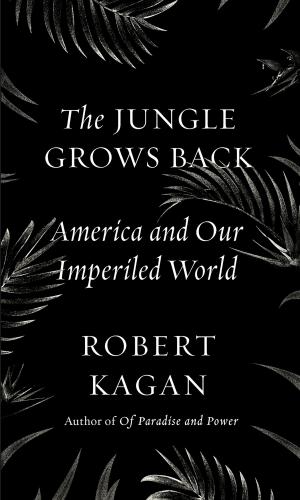
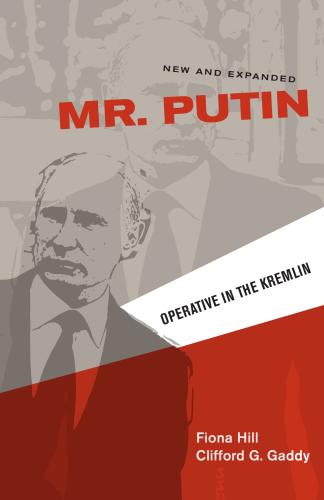
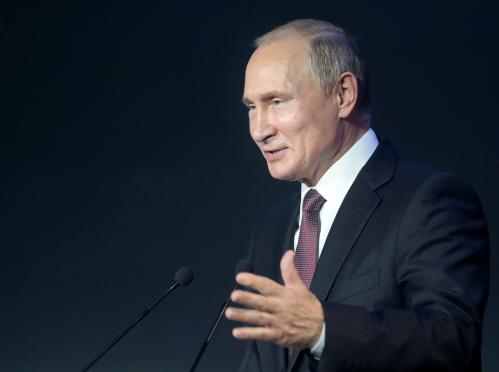
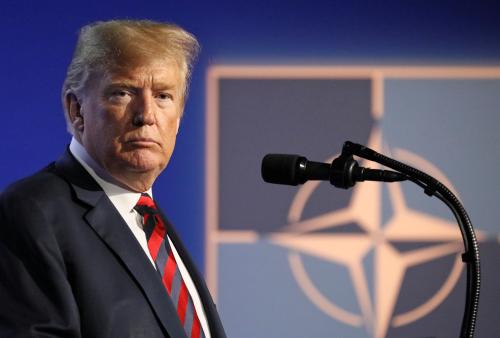
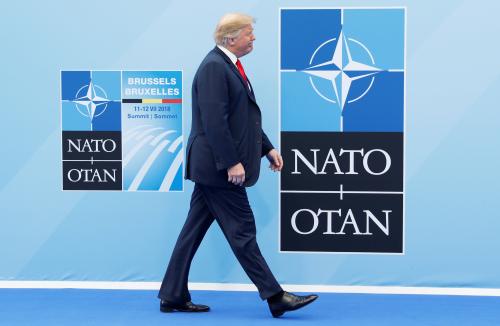




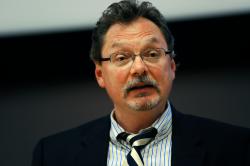

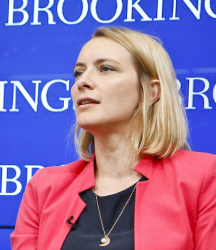

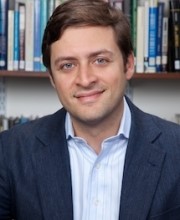



Commentary
Around the halls: Brookings experts react to the Trump-Putin meeting and NATO summit
July 16, 2018